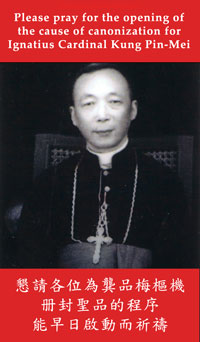Hypocrisy or Tactful Machination?
Assessing a Pastoral Letter of the Government-Approved
Catholic Bishop's (Patriotic Association) Conference in China
by Matthias Lu, Ph.D., S.Th.L.
Spring 1996
![]()
Father Matthias Lu, Ph.D., S.Th.L., director of the St. Thomas Aquinas Center at St. Mary's College in Moraga, California, is a consultant for the International Association of Educators for World Peace, a non-governmental organization under UNESCO auspices. Evaluating the previous document in this dossier, Lu analyzes the language of the document, explains the status and structure of the Chinese government approved bishops conference, and critiques the pastoral letter's endorsement of "China's Platform for the Development of Women."
Reprinted with permission of Rev. Matthias Lu and
Catholic International Assumption Communications
101 Barry Road, Worcester, MA 01609-1178
Copyright 1996 All Rights Reserved
![]()
THE ISSUE
The UCAN Dispatch No. 839/8 gave the title "Chinese Bishops' First Pastoral is on Women," and further specified saying: "The Chinese Government-Approved Bishop's Conference of the Catholic Church in China has issued its first pastoral letter since its inauguration in 1980. It was issued on August 28, just before the Fourth World Conference on Women held in Beijing."
The Pastoral rallied the Catholics saying: "We must unite ourselves with the whole nation to implement "China's Platform for the Development of Women' formulated by the government."
THE COMMENT
Now for a comment, I limit myself to three points: the terminology, the nature of the Chinese Catholic Patriotic Church. and China's Platform.
Point One: Terminology
The term "Chinese Bishops' First Pastoral is on Women," to be properly understood, should be rewritten to say: "Chinese Patriotic Bishops' First Pastoral is on Women." In that sense, it is true that this is their first Pastoral letter. They have never issued a Pastoral letter since the beginning of their Conference (established in 1980) or since their formal separation from Rome in 1957. On separating themselves from Rome, they made themselves bishops by self-election and self-consecration without the Holy See's authorization. To establish their Conference, they used a procedure and wrote a constitution both incompatible with the Law and the Tradition of the Church. In each case, they formally defied the authority of the Holy See. By their law and statues, they resolved to reject the Holy See completely and separated themselves forever from the Government of the Church. They wanted their church to be a Chinese Patriotic Church and not a Roman Catholic Church. They chose to be Chinese Patriotic bishops, and as such they can never identify themselves as Roman Catholic bishops.
The name "The Chinese Government-Approved Bishops' Conference of the Catholic Church in China" is a euphemism and misnomer. In reality, it stands for "The Chinese Patriotic Bishops' Conference of the Chinese Catholic Patriotic Association in China." This formula is the exact interpretation of the name. The information services must use this interpretation and express it clearly in all contexts in order to avoid misleading readers.
The term "government-approved" means "government-created-and- manipulated" or "controlled." Irrevocably vowed to be "anti-Roman Catholic" and "anti-Papal" or "anti-foreign," it belongs to the United Front complex, demanding socialist revolutionary emancipation from Papal or foreign domination.
The term "Chinese Catholic Patriotic Association" (CCPA) is a general name chosen by history to signify three in one: (a) the Association as a society, (b) the Chinese Catholic Patriotic Three Self-Movement, and (c) the Chinese Catholic Patriotic Three-Self Reformed Church. It is elastic and flexible to mean a society, a movement, or a church. It may even mean all the three combined. It denotes a complex historical, social, and political reality which exists in China but it is also found elsewhere in disguise and under a different name.
The term, as a general name, is a conventional title given by history. For the conventional use of this name, the historical definition, once it is written, remains written in man's heart. It can no longer be erased or altered, even though, in the last couple of years, the Communist editorial policy has been trying to replace it by the simple term "Catholic Church" , for their advantage.
Point Two: The Nature of the Chinese Catholic Patriotic Church
As explained above, by whatever name it is called, the Chinese Catholic Patriotic Church nomenclature is a misnomer. It is devised to disguise its real nature which consists of the following by its affiliation and purpose: a political agency of the Marxist Socialist United Front. Its commitment is to manipulate the mass of the Catholic population in order to integrate them into the Socialist revolutionary movement by submitting them to the leadership of the Communist Party in all things. This fundamental commitment constitutes its real nature.
This commitment is embodied in the statutes of the Association and in the constitution of its bishops' conference. It specifies the "Three-self" principles of "self-generation, self-government, and self-reliance" for self-subsistence in liberty and independence - all high-sounding principles. What they actually mean, however, is total submission to the Party's control to further socialist goals. These goals are Marxist, atheistic, anti-religious, anti-hierarchical, anti-Church, and anti-foreign in all actions and intentions.
With these intentions, which emanate from the fundamental commitment, whatever the CCPA does under a religious guise can never be truly religious. It is a show put on to mislead. Its orders of Priesthood and Episcopacy can neither be licit nor valid. According to its corporate nature, it is not a part of the Body of Christ, and, without Christ, it can do nothing licit or valid. Being contrary to the intention of Christ and his Church, the CCPA performs sacramental rites in vain. Its sacraments are null and sacrilegious. Moreover, the sweeter and holier its prayers and preaching sound, the more deceitful they are.
Point Three: China's Platform on Women
The Platform on Women for the Beijing Conference of 1995 is similar to the Platform on the Family for the Cairo Conference of 1994. The Patriotic bishops' letter showed no intention to support the efforts of the Holy See. It made no mention of the Holy See's delegation which was present at both conferences. Emphasizing innocent high-level general principles, the Platform leaves the nation's One-Child-Per-Family policy and law intact under silence between the lines. The policy will be enforced as a measure for general welfare and health on a voluntary basis as provided by the Platform under the cover of "free choice, national need, and common good."
In practice, women are educated and persuaded to volunteer by methods which they have no power to resist to abide by the laws. Rallying the people to support the government policies, the Patriotic bishops satisfy themselves by preaching the good general principles while keeping silent on the specific immoral issues entirely, as the government's Platform itself did in a similar way. Their common task is to sway the people into supporting the national policy. This is what the Pastoral letter was written to do. Is this hypocrisy or tactful machination? Or, is it both! Certainly, they embarrassed the Holy See and the Roman Catholic Church by ignoring them. They avoided identifying themselves and their actions as Roman Catholic. It is good to observe, however, that they did not chastise the Holy See by name, as they did in the past. This may mean that they have made some progress in the right direction. It should be too much to expect them to support the Holy Apostolic See, at least not now.




